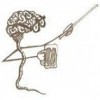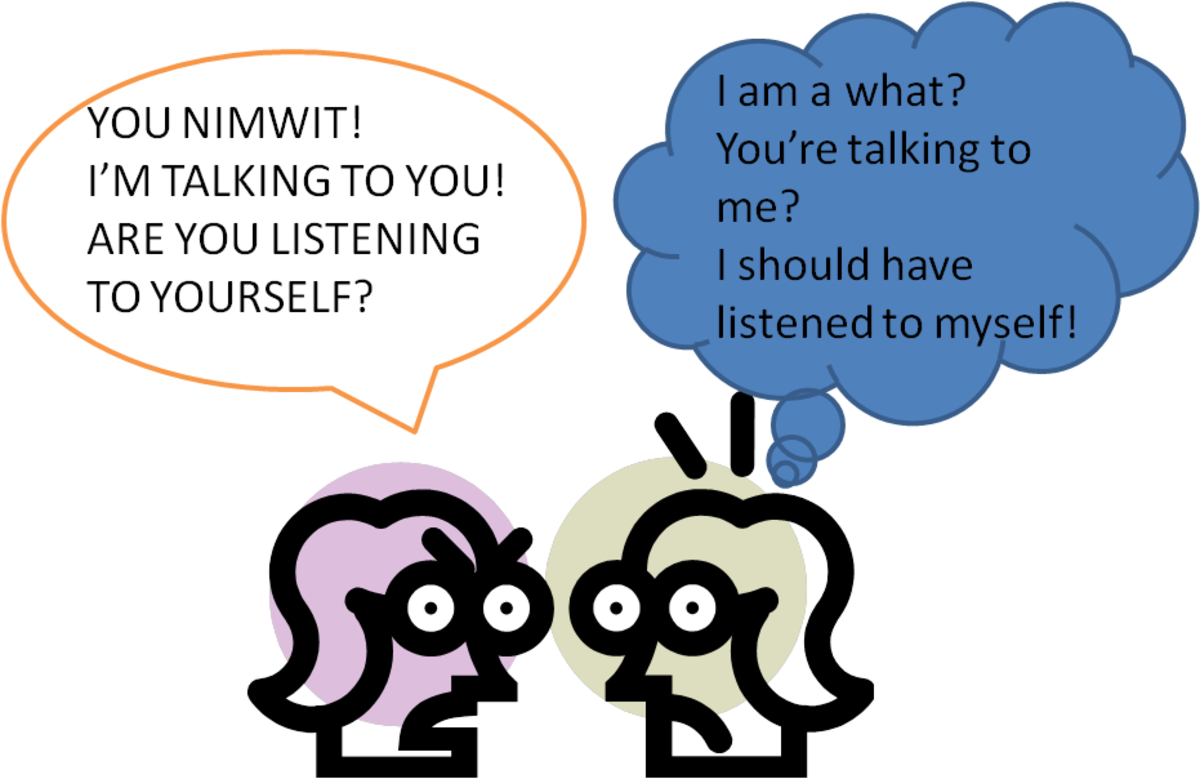What is the Right Way to Say 2010?

Is it “twenty-ten” or “two thousand and ten?”
So, that's the big question: how do you say 2010, and 2011 etc.? Is there a right or wrong way?
If you need this answer quick, I’ll give it to you:
There is no “right” way to say 2010.
However, the upside is, there is no “wrong” way either. What we have is a bunch of people jockeying for attention because they aren’t getting enough from real writing projects and so must prance around crowing about non-existent grammatical rules. Now you’ll have to believe me when I tell you I am as bombastic a know-it-all as you will probably ever meet, and I bore my friends and family to death with the things about writing and grammar that I enjoy. However, one thing I cannot stand is grammar police, especially when they are passing out bad information. So, I am going to use my grammar geek powers for good right now, and save you from the evil grammar Nazis when it comes to this ridiculous, non-existent grammatical debate concerning 2010.
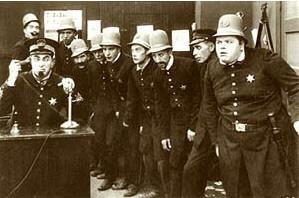
Grammar Police
There’s an organization called NAGG (National Association of Good Grammar) that has gotten some attention for itself claiming that it has the right way of saying 2010 – I struggled to even find their website, much less finding any reason why I should place their opinion over anyone else’s amongst the scads and scads of would be grammar police out there, none of whom should be given any authority when it comes to grammar, particularly for the grammar of speaking, which is what we are talking about here – we’re not talking written grammar; this “debate” is actually about how people talk. And, whoever this NAGG is, while they carry no weight in the grammatical world, you have to give them props for getting so much attention. The fact that they are being quoted all over proves how lazy researchers have become and how willing they are to just take whatever Google barfs up as law more than anything else.
However, my point is not to vilify the NAGG people. I’m sure they mean well, and I even bet they are capable when it comes to wielding language. The main point is that we are talking about the spoken word and not the written, and even more importantly, we are talking about grammar, for which no one, particularly NAGG and others of its ilk, have any say over you. For starters, grammar is a component of communication; it’s about structure and clarity, syntax, spelling, punctuation etc. There’s lots of stuff that falls under the umbrella of “grammar,” but ultimately the point is grammar exists to empower communication. There is no person out there who won’t know exactly what you are saying, whether you say “two thousand and ten” or say “twenty-ten.” Both are equally clear. Congrats, communication successful.
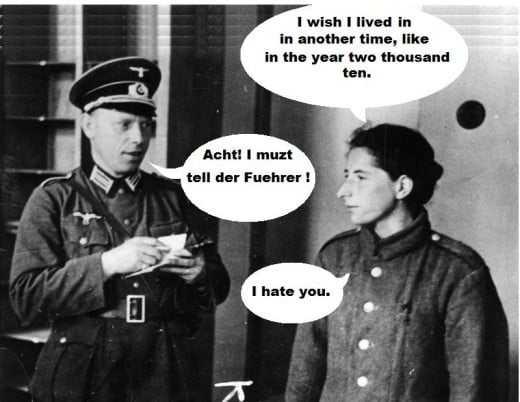
Grammar Rules
Grammatical “rules” come into being through tradition and repetition, and they come and go with equal regularity. There is a reason that the Chicago Manual of Style, the Associate Press Stylebook, the MLA stylebook and any number of others, including individual universities, publishing businesses and even corporations have developed their large tomes of grammatical rules: BECAUSE THERE ISN’T ONE AUTHORITY. Grammar is so confusing, and so unregulated, that all these entities create little sub-grammatical universes in which, at least for the believers of their grammatical religions, there is absolute rule. But, like religion, the rules only count if you buy into THAT particular book. Believers in the other popular books will argue that theirs is right. Etc., yawn, etc.
But ultimately, nobody owns the English language. The Oxford English Dictionary comes about as close to being “the” authority” on English as it gets, and anyone who has ever looked at it can tell you the compilers of the OED are the last people to pretend like they KNOW what anything means or how it should be used, and they definitely don’t tell you how to SAY anything. What they have done is recognize that words and meanings and pronunciations change, and they record as many of those changes as possible supported with rigorously researched efforts to date the period in which the change occurred and when, if at all, it went out of style again.
So, in this light, there is no “right” way to say 2010. Trust me on this. I don’t care how many people with degrees in English (or attitudes that make you believe they have one) tell you that you should say 2010 one way or another. I have spent a small fortune on my undergraduate and graduate degree programs in English, and I assure you, if there is ONE thing I got for the money thus far is the recognition that there are no hard and fast rules. There are guidelines, and some really well established precedents that, if you break them, you will stand out as defying tradition and, therefore, will require some really spectacular reasons for why you did so if you don’t want to look illiterate; but beyond that really long standing “basic” stuff, the 2010 speaking-grammar police (on either side) are full of it. You don’t have to believe me, the San Francisco Chronicle has a UC Berkeley professor on record saying essentially that, although he’s being much more tactful about it than I am. (Article HERE.)
Arguments for “Twenty-Ten”
Yes, if you count to twenty (this is a prevailing argument that uses “logic” to prove the “rule” being used and parroted even by local news agencies), you count, “one, two… ten, eleven… eighteen, nineteen, TWENTY.” Therefore, because of this, you “obviously” must say “twenty-ten” like you would have said “nineteen-ten.” Great, that’s very logical, and it follows from how the previous decades have been spoken, all the way back to perhaps the year 1010. Unfortunately, in 1010, we don’t know how they actually pronounced it because there are no recordings, so, we will be setting the precedent for this particular moment in time. We have a precedent for speaking it out as the first two numbers and the last two from the last few centuries, so, some support exists for saying it “twenty-ten.”
Plus, it’s short and sweet. It makes vernacular sense to say it short, and I bet this is how people will say it most of the time, in time. However, that does not make it "right."

Arguments for “Two Thousand and Ten”
However, we have the last ten years of speaking out the year as “two thousand and whatever” as well, but that’s not all. In addition to the last nine or ten years, we have been speaking it out “the long way” for over forty years. Now, here’s where precedent really starts to kick in for the other side.
Precedents defining grammar comes from usage, generally literary and popular press/media combined. Arthur C. Clarke wrote his novel 2001: A Space Odyssey (along with Stanley Kubrick making the movie) in 1968. It was followed up with a 1983 sequel called 2010: Odyssey Two. Both of these literary and film frames of reference were pronounced the long-way, i.e., “Two thousand one” and “two thousand ten.” There were no bells of alarm at this pronunciation. THAT establishes a precedent for the longer version that has been standing for a considerable period of time. Even older, are speeches from long ago wherein the speakers have pronounced such things as, “The year of our lord nineteen hundred and blah-blah-blah” etc. Here’s a line right out of the U.S. constitution, “"the Year of our Lord one thousand seven hundred and Eighty seven,” taken from article VII.
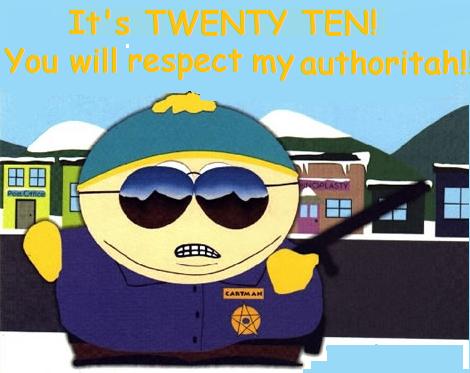
Conclusion
My point is not to prove that saying “two thousand and ten” is correct. My point is to prove that there is no “right” way to say 2010, and that you should not allow yourself to be dictated to by some self-appointed grammar police who have no such authority. Say it how you want, and anyone who tells you otherwise should be laughed at for their self-aggrandizing pomposity or given a hug to relieve the floundering lack of self-esteem that has brought them to such a state as to give them delusions of grammatical grandeur.
